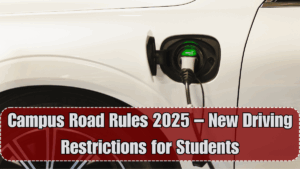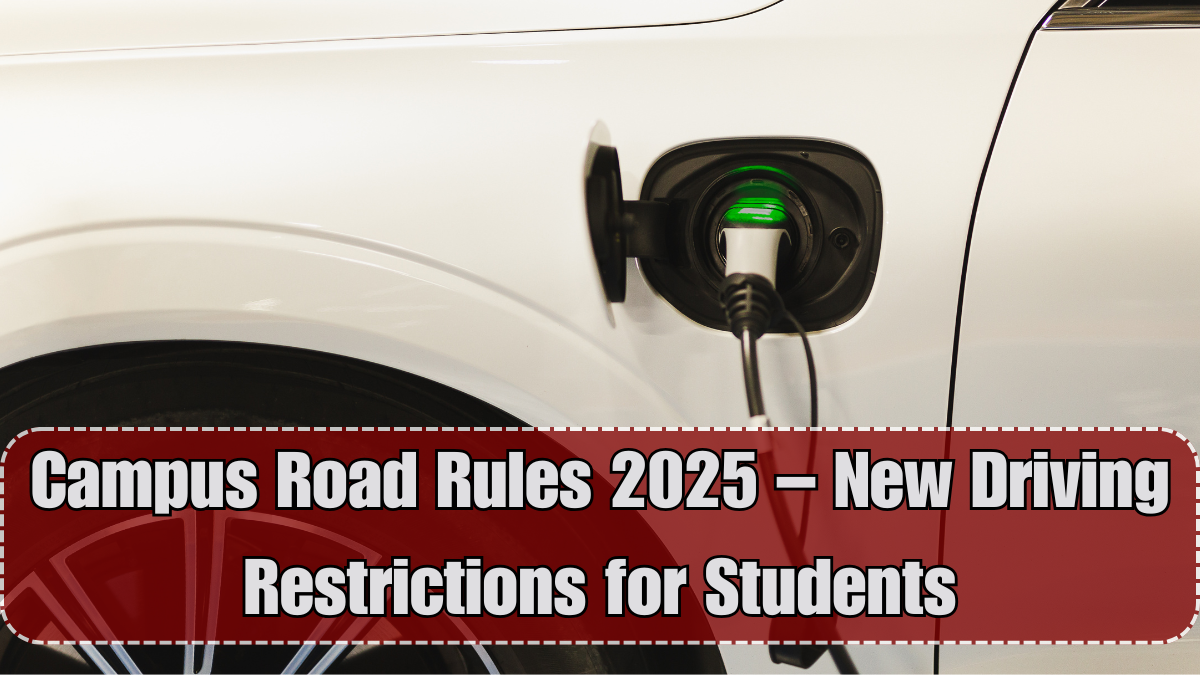Road Rules for Students have undergone a nationwide update in 2025 as part of India’s larger effort to regulate college campus traffic and ensure the safety of young commuters. The Ministry of Road Transport and Ministry of Education have introduced mandatory guidelines for campus transport, focusing on vehicle speed limits, entry permissions, noise control, and parking discipline. These student road rules now apply to all colleges and universities across India.
The updated policy was introduced in response to rising incidents of rash driving, illegal parking, and unregistered vehicles entering educational campuses. Colleges have been directed to implement vehicle entry passes, fixed speed zones, and stricter enforcement of rider documentation. These rules apply to both two-wheelers and four-wheelers used by students for college transport.

Key Campus Driving Restrictions for Students
The new Road Rules for Students are designed to prioritize pedestrian safety and maintain order inside educational campuses. All institutions must follow uniform restrictions as per the 2025 guidelines.
Highlights of the new campus vehicle restrictions include:
-
Two-wheelers must not exceed 25 km/h inside campus
-
Helmets are mandatory even for pillion riders on campus roads
-
Only registered and stickered vehicles allowed to enter
-
Loud horns, modified silencers, and exhaust pipes are banned
-
Entry and exit timing for student vehicles strictly regulated
-
No-parking zones strictly enforced with on-the-spot fines
Security guards, marshals, and digital checkposts are now authorized to issue challans or deny entry to non-compliant student vehicles.
Table: Campus Road Rules 2025 – Student Driving Do’s and Don’ts
| Category | Allowed | Prohibited |
|---|---|---|
| Vehicle Type | Registered 2W/4W with valid documents | Non-registered, borrowed vehicles |
| Speed Limit | Max 25 km/h | Speeding, racing |
| Entry Timing | 7 AM – 9 PM (varies by college) | Late-night entry without approval |
| Modifications | None | Loud exhausts, horns, color mods |
| Documentation | College ID, DL, Insurance, RC | Incomplete or fake documents |
These restrictions are now monitored using smart ID scanners, license plate cameras, and manual logbooks at campus gates.
Fines and Penalties for Violations
The enforcement of college transport rules has been strengthened with the introduction of monetary fines, community service penalties, and, in some cases, vehicle bans for repeat offenders. Colleges are also permitted to report traffic violations to local RTOs.
Penalty structure under the student road rules includes:
-
Fine of ₹500 – ₹2,000 for speed or noise violations
-
₹1,000 fine for non-helmet riding
-
Vehicle impounding for third-time violations
-
Suspension of campus parking privileges for 1–6 months
-
Reporting to parents for underage or unlicensed riders
Some institutions have set up grievance and appeals committees to handle special cases involving medical or emergency transport needs.
Colleges Supporting the New Rules
Most universities and autonomous colleges have implemented the campus vehicle restrictions effectively. They’ve also started awareness drives, student-led patrol groups, and digital passes to encourage smoother adoption of the rules.
Key initiatives being observed:
-
RFID sticker system for approved student vehicles
-
Monthly safety audits by student councils
-
Mandatory driving awareness sessions for hostel residents
-
On-campus speed-breaker redesigns and painted lanes
-
Dedicated walking paths and bicycle-only zones
These efforts aim to create a structured, eco-conscious transport ecosystem within college environments.
Why These Rules Are Important for Student Communities
The new Road Rules for Students are critical in ensuring safety, discipline, and environmental responsibility across campuses. With thousands of students commuting daily via personal vehicles, the absence of proper regulation had become a significant risk factor.
Benefits of the updated rules:
-
Reduces accidents and reckless riding within campus
-
Encourages responsible use of personal vehicles
-
Promotes shared and non-motorized transport like bicycles
-
Prevents overcrowding and chaotic parking situations
-
Strengthens student-police collaboration on road safety
These measures support a safer, more organized approach to college transport, especially in large universities and high-density educational districts.
FAQs
What are the new Road Rules for Students introduced in 2025?
They are national-level guidelines that restrict vehicle use on campus, including speed limits, entry permissions, and noise controls.
Can I bring my two-wheeler into the college premises?
Yes, if your vehicle is registered, has valid documents, and carries a campus-issued entry pass or sticker.
What is the maximum allowed speed for student vehicles inside campus?
The limit is 25 km/h for all vehicles, and exceeding it can lead to fines or vehicle suspension.
Are helmets compulsory inside the campus?
Yes, helmets are mandatory for both riders and pillion passengers—even for short distances.
What if I violate the campus transport rules more than once?
Repeat violations may lead to fines, vehicle impounding, and suspension of your right to bring the vehicle to campus.
Are these rules applicable to all colleges in India?
Yes, the Ministry has mandated all recognized colleges and universities to implement and enforce these student road rules.
Click here to know more.
